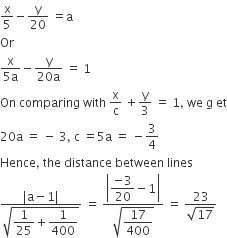 Multiple Choice Questions
Multiple Choice QuestionsThere are two urns. Urn A has 3 distinct red balls and urn B has 9 distinct blue balls. From each urn two balls are taken out at random and then transferred to the other. The number of ways in which this can be done is
3
36
66
66
The area bounded by the curve y = cos x and y = sin x between the ordinates x = 0 and x = 3π/2 is




Solution of the differential equation
cos x dy = y (sin x - y) dx, 0 < x < π/2, is
sec x = (tan x + C ) y
y sec x = tan x + C
y tan x = sec x + C
y tan x = sec x + C
A line AB in three-dimensional space makes angles 45° and 120° with the positive x-axis and the positive y-axis respectively. If AB makes an acute angle θ with the positive z-axis, then θ
30°
45°
60°
60°
The circle x2+ y2 = 4x + 8y + 5 intersects the line 3x – 4y = m at two distinct points if
-85 < m < -35
-35 < m < 15
15 < m < 65
15 < m < 65
An urn contains nine balls of which three are red, four are blue and two are green. Three balls are drawn at random without replacement from the urn. The probability that the three balls have different colours is
1/3
2/7
1/21
1/21
If the vectors  are mutually orthogonal, then (λ,μ) is equal to
are mutually orthogonal, then (λ,μ) is equal to
(-3,2)
(2,-3)
(-2,3)
(-2,3)
The line L given by  passes through the point (13, 32). The line K is parallel to L and has the equation
passes through the point (13, 32). The line K is parallel to L and has the equation  . Then the distance
. Then the distance
between L and K is




D.

Since, the line L is passing through the point (13,32)
Therefore,
The line K is parallel to the line L then its equation must be
Four numbers are chosen at random (without replacement) from the set {1, 2, 3, ..., 20}.
Statement-1: The probability that the chosen numbers when arranged in some order will form an AP is 1 85.
Statement-2: If the four chosen numbers form an AP, then the set of all possible values of common difference is {±1, ±2, ±3, ±4, ±5}.
Statement-1 is true, Statement-2 is true; Statement-2 is a correct explanation for Statement-1.
Statement-1 is true, Statement-2 is true; statement-2 is not a correct explanation for Statement-1.
Statement-1 is true, Statement-2 is false.
Statement-1 is true, Statement-2 is false.
